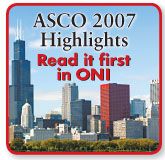Sorafenib Boosts Overall Survival in Advanced HCC
In a randomized phase III trial, patients with advanced, previously untreated hepatocellular carcinoma (HCC) treated with sorafenib (Nexavar) lived 44% longer than those treated with placebo and had a 73% prolongation in time to progression.
ASCO In a randomized phase III trial, patients with advanced, previously untreated hepatocellular carcinoma (HCC) treated with sorafenib (Nexavar) lived 44% longer than those treated with placebo and had a 73% prolongation in time to progression.
The findings represent a significant advance in the management of liver cancer, the fifth most common cancer globally and the third leading cause of cancer death. Lead investigator Joseph Llovet, MD, associate professor of medicine, and director, HCC Research Program, Mount Sinai School of Medicine, New York, reported the results in a plenary session at the 43rd Annual Meeting of the American Society of Clinical Oncology (abstract LBA-1).
The highly statistically and clinically significant overall survival outcome of the SHARP (Sorafenib HCC Assessment Randomized Protocol) study satisfied predetermined early stopping criteria for efficacy, Dr. Llovet reported.
Sorafenib, a multi-targeted tyrosine kinase inhibitor (TKI), was FDA approved in January 2006 for the treatment of advanced renal cell carcinoma. It is the only approved inhibitor of Raf kinase, which is overexpressed and activated in HCC. It also targets receptors for VEGF (vascular endothelial growth factor) and PDGF (platelet-derived growth factor), preventing tumor cell proliferation and neoangiogenesis.
The double-blind, placebo-controlled study was conducted from March 2005 to April 2006 at sites in the Americas, Europe, and Australia/New Zealand. Patients had advanced HCC and no prior systemic treatment, with at least one measurable untreated lesion, an ECOG performance status of 0-2, and Child-Pugh class A liver function status. A total of 299 patients received sorafenib at 400 mg twice daily, given until progression or adverse events requiring discontinuation, and 303 received placebo.

Baseline characteristics were similar for both groups, including median age (65 vs 66 years); sex (87% male in both arms); Child Pugh class A (95% vs 98%; the remainder were class B); and region (88% vs 87% European).
Primary efficacy endpoints of the study were overall survival and time to symptomatic progression (TTSP, assessed by FSHI8-TSP score). Secondary endpoints were time to progression and disease control rate (complete/partial responses plus stable disease for at least two cycles).
Median overall survival for patients randomized to sorafenib was 10.7 months vs 7.9 months for patients who received placebo. Based on 321 deaths at the second interim analysis of overall survival (October 2006)143 in the sorafenib arm and 178 in the placebo armthe hazard ratio (HR) for overall survival with sorafenib vs placebo was 0.69 (P = .00058), representing a 44% improvement for patients who received sorafenib. This significant survival benefit led the data monitoring committee to stop the trial in February 2007.
At 4 months, progression-free survival, assessed by RECIST criteria in an independent review, was 62% for sorafenib patients vs 42% for those on placebo. Median treatment duration was 23 weeks for sorafenib, compared with 19 weeks for placebo.
In a primary TTSP analysis, Dr. Llovet and coinvestigators found no significant difference between sorafenib and placebo (
P
= .77). In an independent assessment of time to progression, sorafenib yielded a 73% prolongation in median time to progression (5.5 months vs 2.8 months with placebo; HR 0.58,
P
= .000007). The disease control rate was also higher with sorafenib (43% vs 32% with placebo).
Well Tolerated
Sorafenib was well tolerated and similar to placebo in the incidence of serious adverse events (52% vs 54%, respectively). The most common drug-related grade 3-4 events were diarrhea (8% with sorafenib, 2% with placebo) and hand-foot syndrome (8% vs < 1%). Incidence of grade 3-4 liver dysfunction and bleeding was less than 1% in both groups. Drug-related serious adverse events were reported in 13% of patients randomized to sorafenib and 9% of patients on placebo.
"Sorafenib is the first systemic therapy to prolong survival in HCC patients, after 30 years of research and more than 100 randomized controlled trials conducted. It is the new reference standard for systemic therapy of HCC patients," concluded Dr. Llovet, who is also professor of research, BCLC Group, IDIBAPS (Institut d'Investigacions Biomediques August Pi I Sunyer), Liver Unit, Hospital Clinic of Barcelona, Spain.
Based on the strength of the SHARP trial data, Bayer HealthCare Pharmaceuticals and Onyx Pharmaceuticals are now in the process of preparing applications to the US Food and Drug Administration (FDA) and European health authorities for a supplemental indication for Nexavar in the treatment of patients with primary liver cancer.
Said Jordi Bruix, MD, co-principal investigator and director of the BCLC Group, "Although much progress has been made in cancer research, the number of lives lost to liver cancer is increasing. For that reason, these results represent an unprecedented achievement, and Nexavar could become the first widely approved new therapy for this difficult to treat cancer."